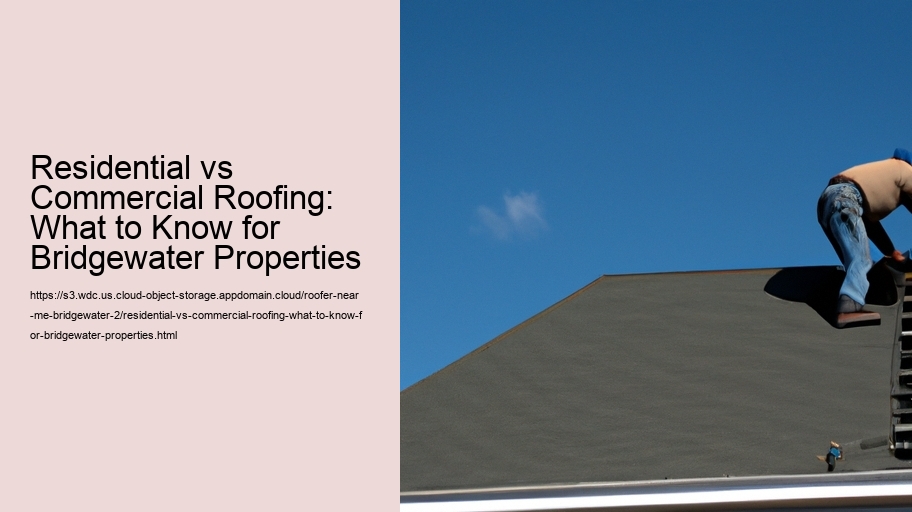Residential vs Commercial Roofing: What to Know for Bridgewater Properties
How to Schedule an Inspection with a Roofer Near Me in Bridgewater .
When considering roofing for properties in Bridgewater, understanding the distinction between residential and commercial roofing is crucial. Each type of roofing has its own set of requirements, materials, and considerations that can significantly impact the longevity and functionality of the roof. Whether you are a homeowner or a business owner, knowing the key differences can help you make an informed decision that aligns with your specific needs and budget.
1. Differences in Design and Structure
The most apparent distinction between residential and commercial roofing lies in their design and structural needs. Residential roofs are typically steep-sloped and are designed to accommodate the aesthetic and functional needs of homes. These roofs generally use materials such as asphalt shingles, wood shakes, metal, or tiles, which are chosen based on the homeowner's preference for appearance and durability.
Conversely, commercial roofs often feature a flat or low-slope design due to the expansive square footage they cover. This design is practical for businesses as it allows for easier installation of HVAC systems and other equipment. Materials commonly used for commercial roofs include single-ply membranes (like TPO, EPDM), modified bitumen, and built-up roofing (BUR) systems. These materials are selected for their durability and ability to withstand the structural demands of larger buildings.
2. Installation Techniques and Complexity
The installation of residential roofing is generally more straightforward compared to commercial roofing. Residential roofs can often be completed within a few days, depending on the size and complexity of the roof. The installation process involves laying shingles or tiles, which is a relatively quick process for experienced roofing contractors.
On the other hand, commercial roofing installation is more complex and time-consuming. The flat or low-slope design of commercial roofs requires specific techniques and materials that can handle the weight and exposure to environmental elements. Additionally, commercial roofs may require specialized equipment and skilled labor to ensure proper installation. This complexity often translates to a longer installation timeline and potentially higher costs.
3. Maintenance and Repair Considerations
Both residential and commercial roofs require regular maintenance to ensure longevity and performance. However, the type and frequency of maintenance can vary significantly between the two. Residential roofs, particularly those with shingles, may require periodic inspections to check for damaged or missing shingles, especially after severe weather.
Commercial roofs, with their flat or low-slope design, are prone to issues such as ponding water, membrane punctures, and leaks. Regular maintenance for commercial roofs often involves more extensive inspections and repairs, as well as routine cleaning to prevent debris accumulation and drainage issues.
4. Cost Implications
Cost is a significant factor when choosing between residential and commercial roofing. Residential roofing is generally more affordable due to the materials used and the relatively simpler installation process. However, costs can vary based on the materials chosen and the size of the roof.
Commercial roofing tends to be more expensive due to the specialized materials and labor required. The larger surface area and complexity of commercial roofs also contribute to higher costs. It's important for property owners to consider the long-term benefits and potential savings from investing in high-quality materials and skilled installation.
5. Environmental and Energy Considerations
In today's environmentally conscious world, both residential and commercial property owners are increasingly considering the environmental impact of their roofing choices. Residential roofs can incorporate eco-friendly materials such as recycled shingles or cool roofing options that reflect sunlight and reduce energy consumption.
Commercial roofing systems often prioritize energy efficiency and sustainability. Options like green roofs, which involve vegetation layers, or reflective roofing materials, which decrease heat absorption, are becoming popular choices for commercial properties in Bridgewater looking to reduce their environmental footprint.
Conclusion
In summary, understanding the differences between residential and commercial roofing is essential for property owners in Bridgewater. Each type of roofing presents unique challenges and benefits that must be carefully weighed based on the specific needs of the property. By considering factors such as design, installation, maintenance, cost, and environmental impact, property owners can make informed decisions that ensure the longevity and efficiency of their roofs. Whether for a cozy home or a bustling business, choosing the right roofing solution is a critical investment in the property's future.
